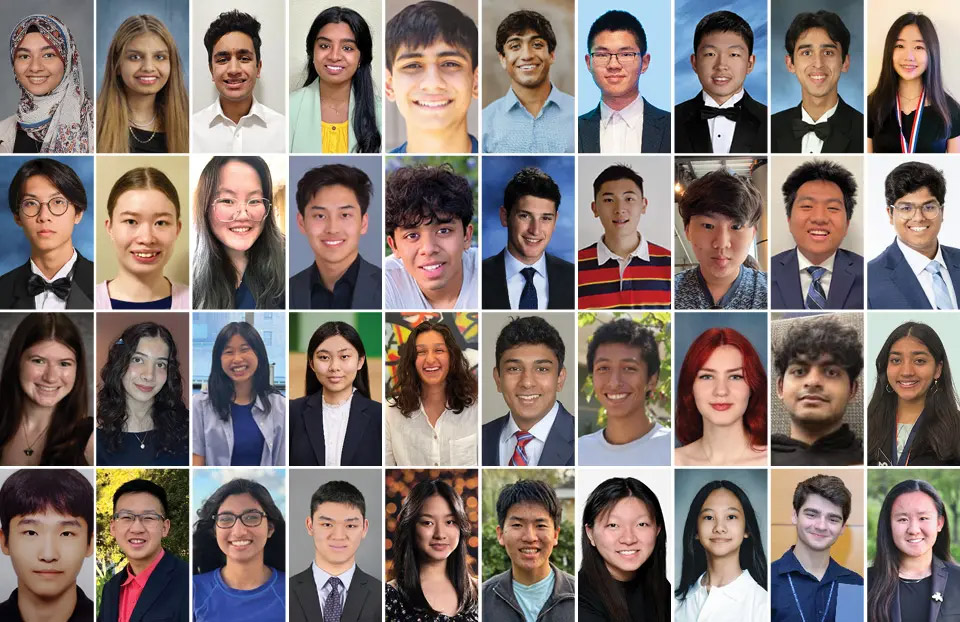Gavriela Beatrice Kalish-Schur is just 18 years old, but she recently came up with a novel idea for how fruit fly research might help people suffering from anxiety.
The high school senior always had an interest in science. Growing up in Philadelphia, she regularly enjoyed visiting city institutions like the Franklin Institute and the Natural History Museum. Now, that interest has won her $25,000 — and she has a chance to win even more as a finalist in the Regeneron Science Talent Search STS.
The annual contest is hosted by pharmaceutical giant Regeneron in partnership with the Northwest DC-based Society for Science. It has the goal of encouraging the most promising young scientists to pursue ideas that address pressing societal challenges.
An applicant pool of over 2,000 students submitting original research is narrowed down to 40 finalists, who compete for $1.8 million in prizes. Awards range from $40,000 to $250,000, and winners’ schools also receive funding to support STEM education.
See the full list of 2024 finalists
Kalish-Schur’s submission concerns a protein in a fruit fly’s stress response pathway called IRE1. When the protein isn’t functional, the insect exhibits behavior reminiscent of anxiety in humans. Given the research, Kalish-Schur hypothesizes that individuals with loss of function in the IRE1’s pathway are predisposed to anxiety. By looking at the mechanisms behind anxiety, she suggests, more targeted treatments could be developed.
The Masterman School senior got started in this research by proactively reaching out to university professors whose work she found interesting. She eventually found Nirmala Nirinjini Naidoo, an associate professor at the University of Pennsylvania’s Perelman School of Medicine, who took Kalish-Schur under her wing.
She thinks more teenagers would get involved in the sciences if they knew about the resources available to them in their local community.
“Dr. Naidoo permitted me to come join her lab and taught me skills that I needed, and allowed me to develop my own independent projects,” Kalish-Schur told Technical.ly. “I definitely feel very lucky that I was able to get to the lab that I’m in, but I want people to know that it’s an option for them. Especially in Philadelphia, it’s something that can be accessible to students if they’re empowered and supported enough by the rest of their ecosystem.”
3D-printed limbs and galaxy-traveling organisms
Another of this year’s 40 Regeneron STS finalists is Arav Bhargava, a student at The Potomac School in McLean, Virginia. He developed a universal socket for prosthetic limbs that can be produced using a 3D printer, potentially reducing the cost significantly. He imagines it might be most widely used in developing countries.
Bhargava demonstrated a prototype during an interview with Technical.ly, noting that the socket passed evaluations for comfort and its ability to hold weight. It’s made of flexible material and has an open cuff, with dials that allow for adjusting tightness and length — an implementation he likened to a bike shoe.
He’s even made contact with international nonprofits, Bhargava said, that have their own 3D printers and could potentially act as partners to distribute the devices to people in need.
Bhargava, who will attend Harvard in the fall, is interested in commercializing his project into a startup. He said he’s long been passionate about the field of prosthetics, explaining that the space is ripe for innovation as existing solutions are expensive and can be uncomfortable; for instance, the devices can rub against the skin and cause build-up in sweat on the wearer, especially if they aren’t the correct size. A universal solution is much more affordable than custom-made sockets.
“I think it’s a huge problem and it could change the lives of a lot of people, the cost being 1% of the cost of normal prosthetics,” Bhargava added.

Another finalist, David Cao from Thomas Jefferson High School in Alexandria, Virginia, submitted research on ‘Oumuamua, the first confirmed object from another star to enter Earth’s solar system. There has long been discussion in the scientific community regarding whether life can be seeded on planets through organisms riding aboard interstellar objects. Cao drew on this work to determine how large something sharing ‘Oumuamua’s traits might have to be to protect microorganisms from gamma rays.
Cao acknowledged much of the research is still speculative, but said it still offers the closest evidence we have to explain the origins of life on Earth and elsewhere. He pointed to interest in last year’s Congressional hearings on UFOs to highlight how many want to learn if there’s life beyond our planet.
Regeneron and the Society for Science have been hosting Science Talent Search for 83 years, according to an announcement, and alumni have gone on to win 13 Nobel Prizes, among other achievements.
This year’s finalists will head to DC for a week-long competition from March 6 to 13, where they will undergo a rigorous judging process. The announcement said that this year’s top 10 winners will be announced during a livestreamed event on March 12. Before then, on March 10, finalists weill have a chance to meet members of the public during an exhibition at the Martin Luther King Jr. Memorial Library.
Learn more about the March 10 event
All the finalists who’ve made it this far have already won significant sums for their work. Bhargava said winning the top prize isn’t a big deal.
“The real thing I’m excited about is just meeting these other 39 really talented kids,” Bhargava said, “because these people are so passionate about their areas, like I am about mine.”







